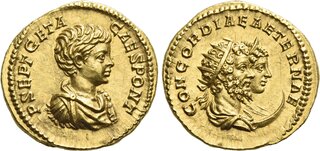| Numismatica Ars Classica > Auction 146 | Auction date: 8 May 2024 |
| Lot number: 2372 Price realized: This lot is for sale in an upcoming auction - Bid on this lot  | Show similar lots on CoinArchives Find similar lots in upcoming auctions on |
| Lot description: Geta caesar, 198 – 209. Aureus 201, AV 20 mm, 7.25 g. P SEPT GETA – CAES PONT Bareheaded, draped and cuirassed bust r. Rev. CONCORDIAE AETERNAE Jugate busts r. of Severus, radiate and draped, and Julia, diademed and draped, on crescent. C –. BMC p. 196 note*. RIC 7b. Calicó 2927 (these dies). Extremely rare and among the finest specimens known. Three portraits of exquisite style perfectly struck and centred on a full flan. Superb reddish tone, virtually as struck and almost Fdc Ex Leu 86, 2003, 915 and NAC 100, 2017, 556 sales. From the de Guermantes collection. Possibly from the Karnak hoard of 1901. The Severans, not unlike previous emperors, often associated themselves with certain deities. In general terms Septimius Severus likened himself to Serapis, Caracalla to Hercules, and Geta to Bacchus. On this dynastic aureus we find entirely different associations: Septimius wears a radiate crown, equating himself with the sun-god Sol, and Domna's bust rests upon a crescent moon, equating her with the moon-goddess Luna, the celestial consort of Sol. Such imagery reinforces the long-held idea that the very nature of men and women is polar: night and day. This form of expression for that distinction extends through much of Roman coinage, especially later in the empire when double-denominations are indicated, in which case if it is a coin depicting a male, typically he wears a radiate crown, and if the coin bears the portrait of a female, her bust usually rests upon a crescent. The youthful portrait of Geta here depicts a young man around twelve years of age. He is bareheaded, denoting his rank as Caesar, and is depicted wearing a military cloak of a soldier of high rank over a protective cuirass, indicated by the pteruges at the shoulders. Severan propaganda was at pains to promote not only an image of a happy family sharing the responsibilities of rule, but also a dynasty capable of dealing with the military threats to the Roman Empire. In fact, Severus' aim was for his two sons to rule jointly after his death, assigning each with command responsibilities (Caracalla with military command, Geta with administrative command). As events turned out, however, the two boys detested one another and were incapable of ever working together, with Caracalla finally having Geta murdered in front of his mother. Estimate: 150000 CHF |  |



